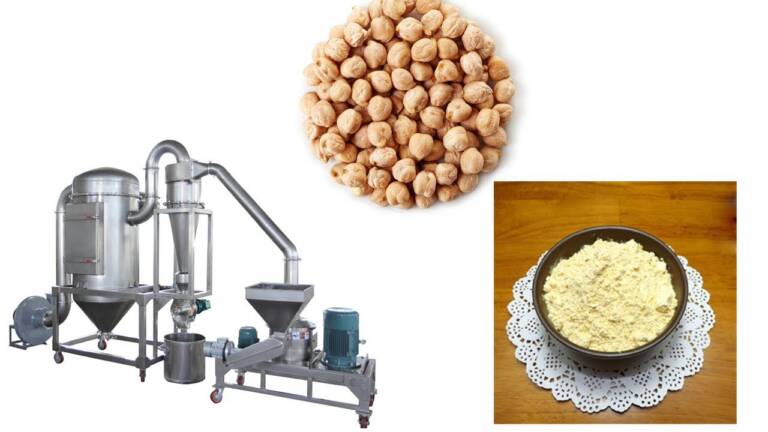Project Report For Besan Flour Mill
Introduction
Project Report For Besan Flour Mill is as follows.
A besan flour mill is a specialised facility or institution that produces besan flour, also known as gramme flour or chickpea flour, from chana dal (split chickpeas). Besan flour is a versatile ingredient found in many Indian, Middle Eastern, and Southeast Asian dishes.
It is manufactured by grinding dried chana dal into a fine powder, the texture of which can range from gritty to smooth depending on the ultimate usage. The washing and grading of chana dal is the first step in the milling of besan flour. The dal is thoroughly scrutinised for impurities or extraneous substances, like as stones, dust, or broken grains. After cleaning, the chana dal is often steeped in water to soften it, allowing for a more effective grinding procedure.
The chana dal is drained and dried after soaking to eliminate extra moisture. The dried dal is then placed into a besan flour mill, where it is ground or milled. To attain the proper texture and fineness of the besan flour, several milling devices, such as stone mills or impact mills, can be utilised. Depending on the milling technique and screen size utilised, the milling process breaks down the chana dal into small particles, resulting in smooth or coarse besan flour.
After grinding, the besan flour is sifted to eliminate any bigger particles or contaminants. Sifting also aids in achieving a consistent texture and uniformity throughout the flour. After that, the finished product, besan flour, is packed for distribution and sale.
Besan flour is a versatile ingredient that may be used in a variety of recipes. It is a common ingredient in Indian cuisine, where it is used to make pakoras (fritters), dhokla (steamed savoury cakes), besan ladoo (sweet balls), and other gravies and batters. It is also used to thicken soups, sauces, and curries, as well as as a binding agent in vegetarian and vegan dishes.

Benefits of Besan Flour Mill
High-Quality Besan Flour Manufacturing: A specialised besan flour mill assures high-quality besan flour production. The mill is outfitted with specialised technology and procedures intended exclusively for the manufacture of gramme flour. This assures that the besan flour has a uniform texture, purity, and quality.
Increased Efficiency And Productivity: A besan flour mill employs efficient machinery and processes, resulting in increased productivity. When compared to traditional techniques, the mill can handle a significant amount of gramme flour in less time. This greater efficiency contributes to meeting the market’s expanding demand for besan flour.
Quality Control And Hygiene: Besan flour mills use extensive quality control processes to guarantee that the besan produced satisfies the needed requirements. To keep the product clean and pure, the mills use hygiene practises and adhere to food safety requirements. This guarantees that consumers obtain safe and uncontaminated besan flour.
Customization And Versatility: Besan flour mills provide the flexibility to create besan flour with particular qualities, such as varied textures or fineness levels, to meet the varying demands of customers and food makers. This customisation option offers for greater versatility in the use of besan flour in a variety of culinary applications.
Market Potential Of Besan Flour Mill's
The size of the global besan flour market is anticipated to reach $5.2 billion by 2027, expanding at a CAGR of 4.3% from 2022 to 2027.
Chickpea flour is made by crushing dry and whole chickpeas. Chickpeas are mostly grown in tropical and subtropical climates. Chickpea flour is widely used in Indian cuisine for cooking and baking. Chickpeas are a popular food in Southern Europe and South Asia. It is classified as a pulse and is noted for being a cholesterol-free source of protein and fibre.
Chickpea flour is very high in vitamins and minerals, and it dramatically increases manganese and folate consumption. The Desi category of chickpea flour presently leads the chickpea flour business, with a USD 4.1 billion market share predicted by 2032. Chickpea consumption is increasing due to its excellent nutritional value among plant protein sources. Because of its strong amino acid balance, low levels of anti-nutritional components, large amounts of complex carbohydrates, and protein bioavailability, chickpea flour has emerged as a beneficial ingredient for the food processing sector.
Project Report Sample on Besan Flour Mill
Need Help?
Create 100% Bankable Project Report

